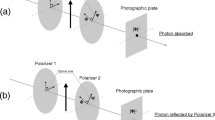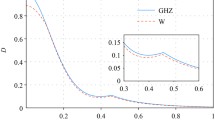Abstract
In this paper I demonstrate that the quantum correlations of polarization (or spin) observables used in Bell’s argument against local realism have to be interpreted as conditional quantum correlations. By taking into account additional sources of randomness in Bell’s type experiments, i.e., supplementary to source randomness, I calculate (in the standard quantum formalism) the complete quantum correlations. The main message of the quantum theory of measurement (due to von Neumann) is that complete correlations can be essentially smaller than the conditional ones. Additional sources of randomness diminish correlations. One can say another way around: transition from unconditional correlations to conditional can increase them essentially. This is true for both classical and quantum probability. The final remark is that classical conditional correlations do not satisfy Bell’s inequality. Thus we met the following conditional probability dilemma: either to use the conditional quantum probabilities, as was done by Bell and others, or complete quantum correlations. However, in the first case the corresponding classical conditional correlations need not satisfy Bell’s inequality and in the second case the complete quantum correlations satisfy Bell’s inequality. Thus in neither case we have a problem of mismatching of classical and quantum correlations. The whole structure of Bell’s argument was based on identification of conditional quantum correlations with unconditional classical correlations.

Similar content being viewed by others
References
Bell, J.S.: On the einstein podolsky rosen paradox. Physics 1(3), 195–200 (1964)
Bell, J.S.: Speakable and Unspeakable in Quantum Mechanics. Cambridge University Press, Cambridge (1987)
Khrennikov, A.: Interpretations of Probability. VSP Int. Sc. Publishers, Utrecht/Tokyo (1999); De Gruyter, Berlin, (2009), second edition (completed)
Kolmogoroff, A.N.: Grundbegriffe der Wahrscheinlichkeitsrechnung Springer Verlag, Berlin (1933); English translation: Kolmogorov, A.N.: Foundations of Theory of Probability. Chelsea Publishing Company, New York (1956)
Khrennikov, A.: Contextual Approach to Quantum Formalism. Springer, Berlin (2009)
Khrennikov, A.: Frequency analysis of the EPR-Bell argumentation. Found. Phys. 32, 1159–1174 (2002)
Khrennikov, A.: Bell-Boole inequality: nonlocality or probabilistic incompatibility of random variables? Entropy 10, 19–32 (2008)
Avis, D., Fischer, P., Hilbert, A., Khrennikov, A.: Single, complete, probability spaces consistent with EPR-Bohm-Bell experimental data. In: Accardi, L., Adenier, G., Fuchs, C.A., Jaeger, G., Khrennikov, A., Larsson, J.-A., Stenholm, S. (eds.) Foundations of Probability and Physics-5, vol. 1101, pp 294–301. AIP, Melville, NY (2009)
Khrennikov, A.: CHSH Inequality: quantum probabilities as classical conditional probabilities. Found. Phys. 45, 711–725 (2015). doi:10.1007/s10701-014-9851-8
Von Neumann, J.: Mathematische Grundlagen der Quantenmechanik. Springer, Berlin (1932). English translation: Mathematical Foundations of Quantum Mechanics. Princeton University Press, Princeton (1955)
Aspect, A.: Three experimental tests of Bell inequalities by the measurement of polarization correlations between photons. PhD-thesis, Orsay Press (1983)
Aspect, A.: Bell’s Theorem: The Naive View of an Experimentalist. arXiv:quant-ph/0402001
Accardi, L.: The probabilistic roots of the quantum mechanical paradoxes. In: Diner, S., Fargue, D., Lochak, G., Selleri, F. (eds.) The Wave-Particle Dualism. A Tribute to Louis de Broglie on his 90th Birthday, pp. 47–55. D. Reidel Publishing Company, Dordrecht (1970)
Accardi, L.: Some loopholes to save quantum nonlocality. In: Khrennikov, A. (ed.) Foundations of Probability and Physics-3, vol. 750, pp. 1–20. AIP, Melville, NY (2005)
Hess, K., De Raedt, H., Michielsen, K.: Hidden assumptions in the derivation of the Theorem of Bell. Phys. Scr. 2012, 014002 (2012)
De Raedt, K., Keimpema, K., De Raedt, H., Michielsen, K., Miyashita, S.: A local realist model for correlations of the singlet state. Euro. Phys. J. B 53, 139–142 (2006)
De Raedt, H., Jin, F., Michielsen, K.: Data analysis of Einstein-Podolsky-Rosen-Bohm laboratory experiments, The Nature of Light: What are Photons? V, In: Roychoudhuri, C., De Raedt, H., Kracklauer, A.F. (eds.) Proceedings of SPIE, vol. 8832, 88321N–88321N-11 (2013)
Kupczynski, M.: Bertrand’s paradox and Bell’s inequalities. Phys. Lett. A 121, 205–207 (1987)
Kupczynski, M.: Entanglement and Bell inequalities. J. Russ. Laser Res. 26, 514–523 (2005)
Hess, K.: Einstein Was Right!. Pan Stanford, Singapore (2014)
Griffiths, R.B.: Consistent quantum theory. Cambridge University Press, Cambridge (2002)
De Raedt, H., Hess, K., Michielsen, K.: Boole-Bell inequalities applicable to quantum theory. J. Comput. Theor. Nanosci. 8, 1011–1039 (2011)
Author information
Authors and Affiliations
Corresponding author
Rights and permissions
About this article
Cite this article
Khrennikov, A. Unconditional Quantum Correlations do not Violate Bell’s Inequality. Found Phys 45, 1179–1189 (2015). https://doi.org/10.1007/s10701-015-9930-5
Received:
Accepted:
Published:
Issue Date:
DOI: https://doi.org/10.1007/s10701-015-9930-5




